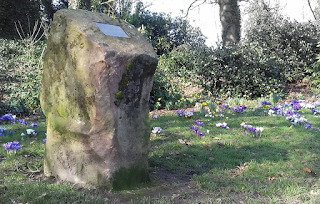Despite all the restrictions we have faced during the Corona virus pandemic, we have still quietly continued to make improvements to the Rose Garden. The plight of the bee population has been well documented recently. We can all play a small part in helping to improve the chances of bees in our gardens and local green spaces.
 |
| Sedum and yellow Inula bee favourites. |
 |
| Pulmonaria, an early Spring flowering perennial. |
The long border already provides pollen and nectar over as long a period as possible. Starting in late January with hellebores and snowdrops, then comfrey, pulmonaria, daffodils,crocus and forget-me-nots, followed by many more perennials. Sedums are partuclarly good for bees in September. The border always has something in flower until as late as October. If you too plant in your garden with bees in mind, you will attract a myriad of flying insects to your plot. A garden without butterflies and bees would be a sad place indeed. The RHS (Royal Horticultural Society) has online lists of which plants are beneficial to bees, butterflies or both. There is lots of information available online, or in books. Kate Bradbury is a passionate advocate of wildlife and ways in which we can help.
 |
| Long border at the beginning of August. |

The Friends group has already installed bird nesting boxes and a bat box around the edges of the Rose Garden. Recently, we created a bug hotel inside one of the shrub borders to provide shelter for all kinds of "minibeasts". The bug hotel has been very popular. So much so, that children and their parents have made well trodden paths to and from it. We even used an old fallen branch as a rustic seat close by.
Our latest additions are two bee hotels for solitary bees to lay their eggs in, which hatch out the following Spring. Apart from honey bees, which can sting you if disturbed and which live in large hives, all the other 230 or so wild bee species are called solitary bees. They do not build communal nests. None of them will sting you and most do not even have stings. Our bee hotels are aimed at these solitary bees, paricularly Mason bees and Leafcutter bees. The female places a store of pollen in a tube, lays an egg on it then blocks it up, before laying another egg and so on until the tube is full. After the egg hatches, the bee larvae eats up the pollen store before it turns into a bee and burrows its way out around March time the following year. Sometimes birds will try and peck into the tubes to eat the bee larvae over Winter. The nesting tubes can be kept in a cool shed during the winter for protection from predators, then brought out again in March.
It is important to replace the nesting tubes every couple of years to prevent the build up of any pests and diseases. Solitary bees are only around in our gardens for a few months during which they mate and lay their eggs before dying.
 |
| Top end of the long border. |
As you can see, our bee hotels have a roof to keep rain out. They are in a South facing sunny position and are up at a height where they can fly in and out easily. All bee hotels should be at least a metre off the ground. Hopefully we will see bees flying in and out this Summer, busily laying their eggs. We are a little late for Mason bees this year, but Leafcutter bees are still around. They are particularly fond of Globe thistle(Echinops),which is just in flower now at the top end of the long border. We have even used a lovely blue globe thistle flower in our Friends group banner logo. They use curled up leaves, often nibbled from rose leaves, to block each egg cell. Hence the name leafcutter bee. Maybe you can build a bee box for your garden too.
 |
| Middle of the long border. |






















